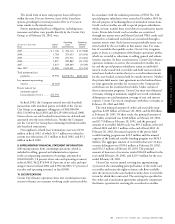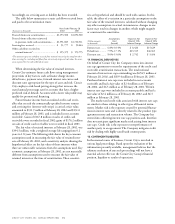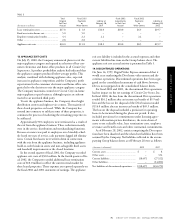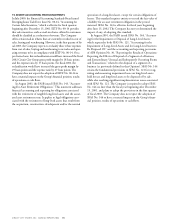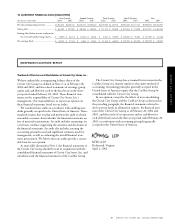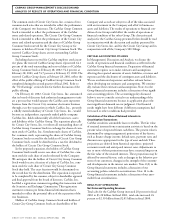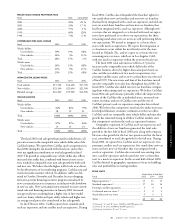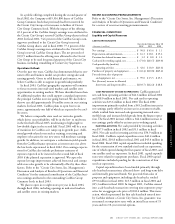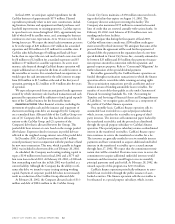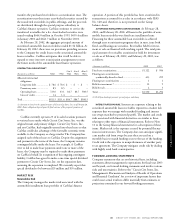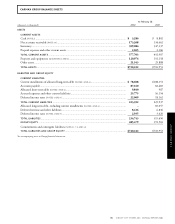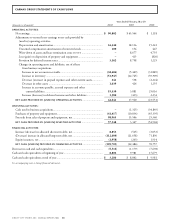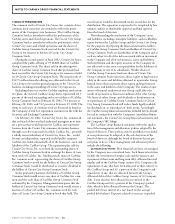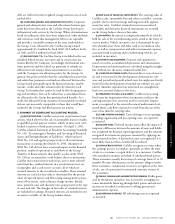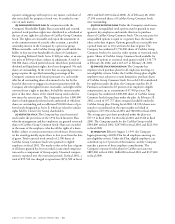CarMax 2002 Annual Report Download - page 84
Download and view the complete annual report
Please find page 84 of the 2002 CarMax annual report below. You can navigate through the pages in the report by either clicking on the pages listed below, or by using the keyword search tool below to find specific information within the annual report.
CIRCUIT CITY STORES, INC. ANNUAL REPORT 2002 82
In fiscal 2003, we anticipate capital expenditures for the
CarMax business of approximately $175 million. Planned
expenditures primarily relate to new store construction, includ-
ing furniture, fixtures and equipment and land purchases, and
leasehold improvements to existing properties. CarMax expects
to open four to six stores during fiscal 2003, approximately one
half of which will be satellite stores, and, assuming the business
continues to meet our expectations, 22 to 30 stores over the fol-
lowing four years. We expect the initial cash investment per store
to be in the range of $20 million to $27 million for a standard
superstore and $10 million to $15 million for a satellite store. If
CarMax takes full advantage of building and land sale-lease-
backs, then we expect the net cash used to fund a new store will
be $8 million to $12 million for a standard superstore and $5
million to $7 million for a satellite superstore. As a new store
matures, sales financed through CarMax’s finance operation will
require additional use of capital in the form of a seller’s interest in
the receivables or reserves. For a standard used-car superstore, we
would expect the cash investment for the seller’s interest to range
from $0.8 million to $1.5 million at the end of the first year of
operation, growing to $2.2 million to $3.4 million after five years
of operation.
We expect that proceeds from an anticipated credit agreement
secured by vehicle inventory, sale-leaseback transactions and cash
generated by operations will be sufficient to fund capital expendi-
tures of the CarMax business for the foreseeable future.
FINANCING ACTIVITIES. Most financial activities, including the
investment of surplus cash and the issuance and repayment of
short-term and long-term debt, are managed by the Company
on a centralized basis. Allocated debt of the CarMax Group con-
sists of (1) Company debt, if any, that has been allocated in its
entirety to the CarMax Group and (2) a portion of the
Company’s debt that is allocated between the Groups. This
pooled debt bears interest at a rate based on the average pooled
debt balance. Expenses related to increases in pooled debt are
reflected in the weighted average interest rate of the pooled debt.
In December 2001, CarMax entered into an $8.5 million
secured promissory note in conjunction with the purchase of land
for new store construction. This note, which is payable in August
2002, was included in short-term debt as of February 28, 2002.
As scheduled, the Company used existing working capital to
repay a $130 million term loan in fiscal 2002 and a $175 mil-
lion term loan in fiscal 2001. At February 28, 2002, a $100 mil-
lion outstanding term loan due in July 2002 was classified as a
current liability. Although the Company has the ability to refi-
nance this debt, we intend to repay it using existing working
capital. Payment of corporate pooled debt does not necessarily
result in a reduction of the CarMax Group allocated debt.
At February 28, 2002, the Company allocated cash of $3.3
million and debt of $88.4 million to the CarMax Group.
Circuit City Stores maintains a $150 million unsecured revolv-
ing credit facility that expires on August 31, 2002. The
Company does not anticipate renewing this facility. The
Company also maintains $195 million in committed seasonal
lines of credit that are renewed annually with various banks. At
February 28, 2002, total balances of $1.8 million were out-
standing under these facilities.
We anticipate that during the first quarter of fiscal 2003,
CarMax will enter into a multi-year, $200 million credit agree-
ment secured by vehicle inventory. We anticipate that some of the
proceeds from the agreement will be used for the repayment of
allocated debt; the payment on the separation date of a one-time
special dividend to Circuit City Stores, Inc., currently estimated to
be between $25 million and $35 million; the payment of transac-
tion expenses incurred in connection with the separation; and
general corporate purposes. Refer to “Contractual Obligations” for
further discussion of the special dividend payment.
Receivables generated by the CarMax finance operation are
funded through securitization transactions in which the finance
operation sells its receivables while retaining servicing rights.
These securitization transactions provide an efficient and eco-
nomical means of funding automobile loan receivables. For
transfers of receivables that qualify as sales under Statement of
Financial Accounting Standards No. 140, “Accounting for
Transfers and Servicing of Financial Assets and Extinguishments
of Liabilities,” we recognize gains and losses as a component of
the profits of CarMax’s finance operation.
On a monthly basis, CarMax’s finance operation sells its
automobile loan receivables to a special purpose subsidiary,
which, in turn, transfers the receivables to a group of third-
party investors. The investors sell commercial paper backed by
the transferred receivables, and the proceeds are distributed
through the special purpose subsidiary to CarMax’s finance
operation. The special purpose subsidiary retains a subordinated
interest in the transferred receivables. CarMax’s finance opera-
tion continues to service the transferred receivables for a fee.
The investors are generally entitled to receive monthly interest
payments and have committed to acquire additional undivided
interests in the transferred receivables up to a stated amount
through June 27, 2002. We expect that the commitment termi-
nation date will be extended. If certain events were to occur, the
commitment to acquire additional undivided interests would
terminate and the investors would begin to receive monthly
principal payments until paid in full. At February 28, 2002, the
unused capacity of this program was $211.0 million.
CarMax’s finance operation periodically refinances its auto-
mobile loan receivables through the public issuance of asset-
backed securities. The finance operation sells the receivables to
be refinanced to a special purpose subsidiary, which, in turn,



